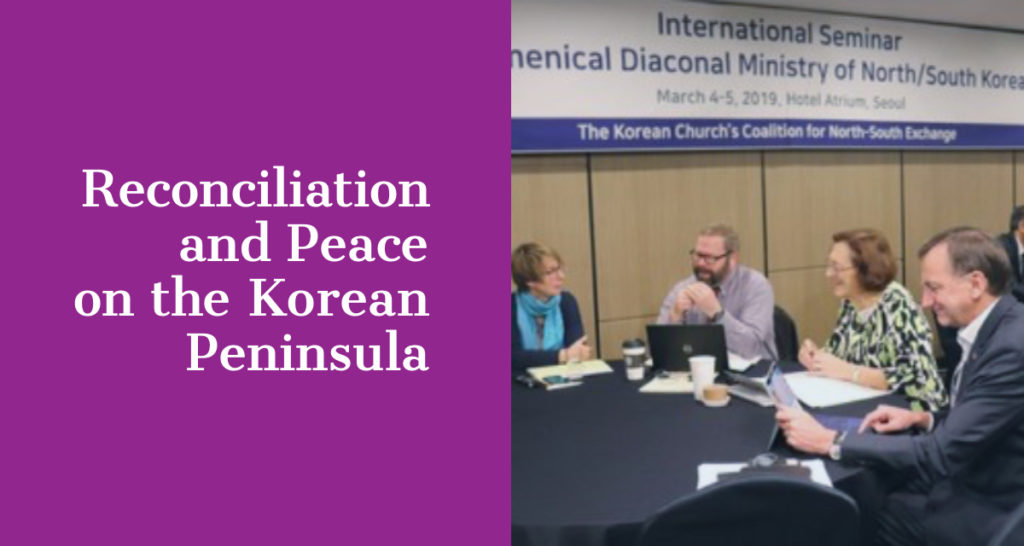Ecumenical diaconal ministry towards reconciliation and peace on the Korean Peninsula
From World Council of Churches
An international seminar held in Seoul on 4-5 March explored how diaconal ministry contributes to the reconciliation and peace work of the global church, and how diaconal ministry efforts can be improved through exchange and cooperation among churches in North and South Korea.
The seminar “Towards Healing and Reconciling Ministry” was organized by the Korean Church’s Coalition for North-South Cooperation, formed to break down the barriers between liberals and conservatives and work together with the global Church for reconciliation and peace on the Korean peninsula.
The participants of the seminar were Korean churches and organizations working on aid and exchange projects with the Korean Christian Federation of North Korea. They acknowledged that the “Panmunjom Declaration for Peace, Prosperity, and Reunification on the Korean Peninsula” is a practical task for their community, and pledged to take the lead on opening a new era of reconciliation, life together, exchange and cooperation.
Participants of the seminar on the Ecumenical diaconal ministry of North/South Korea. Photo: Korean Church’s Coalition for North-South Cooperation
Peter Prove, director, Commission of the Churches on International Affairs, World Council of Churches (WCC) addressed the meeting with admission that WCC carries a certain burden of guilt, as it initially supported the US-led UN intervention in Korea “which we now acknowledge led to an incalculable toll in lives lost and human suffering”.
The UN intervention and the war in which it took part is a proximate cause of the unresolved conflict in the region and the still-prevailing division of the Korean people, “for the healing and reconciliation of which we are all working and praying”, said Prove. “For the WCC this historical responsibility adds a sharper edge to the Christian and ecumenical calling to be peacemakers in the current context of the Korean Peninsula.”
 A resolution issued by the International Seminar of the Korean Church’s Coalition for North-South Exchange states that the peace process on the Korean Peninsula is heading toward its goal and unification of Korea is now an irreversible historical imperative, however “the two Koreas have only taken the first step along with the international community.”
A resolution issued by the International Seminar of the Korean Church’s Coalition for North-South Exchange states that the peace process on the Korean Peninsula is heading toward its goal and unification of Korea is now an irreversible historical imperative, however “the two Koreas have only taken the first step along with the international community.”
Participants of the seminar called upon the South and North Korean churches, the WCC and the international community for the denuclearization of the Korean Peninsula as well as global denuclearization through a permanent peace-building process.
“We call for our partners to join in humanitarian cooperation for the vulnerable especially including children and the disabled”, resolution reads. “We urge everyone to participate in spreading peace education to correct their perception of the North Korean church and society, increase peace sensitivity and achieve reconciliation. For overcoming the trauma of division, we appeal for comprehensive healing ministries and for support of people-to-people exchanges with North Korea.”
Finally, the resolution calls on the global church and civil society to join Korean churches in solidarity for God’s Covenant of Peace, including the process for a peace treaty on the Korean Peninsula. “The road to reconciliation and peace is truly painful and difficult; however, in mutual trust and hope we will not despair, and we will pray and act together until the day inter-Korean reconciliation and coexistence, and peace in Northeast Asia becomes a reality.”
Reflecting on the role for the ecumenical community in this new context of fresh hope for Korean peninsula, Prove pointed out that the ecumenical movement’s most precious resource is now, as before, the relationship with North Korean Christians through the Korean Christian Federation. “Both in terms of the ecumenical impulse for Christian unity through inter-church relations, cooperation, worship and prayer, and in terms of our calling to be peacemakers in the midst of the world’s conflicts, the protection and promotion of this relationship is fundamental”, Peter Prove, urging the worldwide fellowship to share this relationship more widely in their churches and communities.

